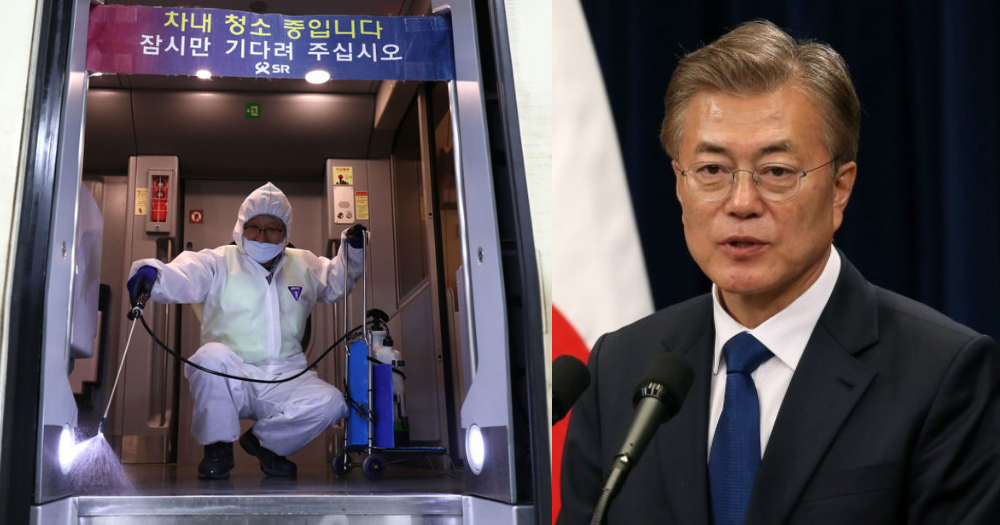South Korea announced on Sunday, Feb. 23 that it has decided to raise its alert level to "red", the highest level.
This came after the announcement of 123 new confirmed cases of Covid-19 in the same morning, bringing the total number of confirmed cases in South Korea to 556.
Alert the highest it's been in 11 years
The Korea Herald reported on Sunday (Feb. 23) morning that South Korea had seen its fourth Covid-19 death, but several hours later, reported a fifth death.
This is the first time in 11 years that South Korea has raised its virus alert level to "serious", the highest in the four-tier system, reported South Korean news agency Yonhap.
The previous instance was during the H1N1 swine flu pandemic.
South Korean president President Moon Jae-in said during his public announcement of the measure, "The COVID-19 incident has been confronted by a grave watershed. A few days from now is a very important moment."
He also added that the government should not hesitate to take "unprecedented powerful" measures to contain Covid-19 without being held back by "regulations".
More than half of new cases linked with church cluster
Out of the 556 confirmed cases, 306 of them have been traced to the Daegu branch of the Shincheonji Church, reported The Korean Herald.
Moon also said that health authorities will be taking "special" steps with members of the Shincheonji Church, reported Yonhap.
The government is trying to trace all of the church's members for testing.
He also requested the cooperation of the church's followers, asking them to refrain from engaging in all collective events for the time being.
Moon clarified that closing Shincheonji-related facilities and limiting its members' actiities are not to restrict religious freedom, but rather are unavoidable measures to protect public health and safety, reported Yonhap.
Meanwhile, 111 cases have been linked to the Daenam hospital in Cheongdo, to which three of the five deaths have also been linked.
"The government will perceive the crisis in Daegu and North Gyeongsang Province as a national one," said Moon. "It will concentrate state capabilities on riding out the difficulty without sparing any support" for Daegu and Cheongdo, which have been designated as "special care zones".
Singapore Ministry of Health advises travellers to be careful
In response to the increase in the number of confirmed cases in South Korea, Singapore's Ministry of Health (MOH) issued a travel advisory in a press release on Feb. 23.
MOH has advised travellers to avoid "non-essential" travel to Daegu and Cheongdo, and to exercise caution when travelling to the rest of South Korea.
MOH also announced that starting from Feb. 23, the definition of suspect cases will be expanded to include people with pneumonia or severe respiratory infections with breathlessness who had been to Daegu and/or Cheongdo within 14 days before onset of symptoms.
Also starting on Feb. 23, MOH said, officers will be looking for travellers with such symptoms at the jet bridges of flights coming in from South Korea and at immigration checks, and anyone meeting the expanded definition will be referred to hospitals for further assessment.
In addition, travellers with recent travel history to Daegu and Cheongdo will be asked to identify themselves.
Read more:
Top image via Photo by Chung Sung-Jun/Getty Images and Jeon Han/Korean Culture and Information Service.
If you like what you read, follow us on Facebook, Instagram, Twitter and Telegram to get the latest updates.
